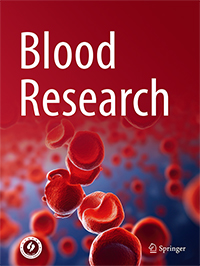Korean J Hematol 1994; 29(3):
Published online September 30, 1994
© The Korean Society of Hematology
급성백혈병에서 CD34 세포면역표지자의 임상적 의의
이석, 민유홍, 이승태, 이정운, 권오헌, 한지숙, 고윤웅
연세대학교 의과대학 내과학교실,
연세대학교 의과대학 임상병리학교실
Clinical Significance of CD34 Antigen Expression in Acute Leukemia
Background: It has been shown by some investigators that the expression of CD34 antigen by leukemic cells of patients with acute myelogenous leukemia was found to be
significantly associated with adverse prognosis. But the others could not confirm the previous reports on the prognostic value of CD34. Discussing CD34 expression in acute leukemia within the context of the recent debate on its possible prognostic relevance, we present our own data on its biological and clinical implications in patients with de novo acute leukemia.
Material and Method : We have analyzed the correlation of CD34 expression with the clinicopathological parameters and therapeutic outcomes to the various chromotherapy in
87 patients with acute leukemia retrospectively. Expression of CD34 antigen on the leukemic blasts was analysed by flow cytometry indirect immunofluorescence method. The leukemic population was considered CD34 positive if at least 10% of bone marrow blast cells reacted with the monoclonal antibody anti-HPCA-1.
Results: In our series, CD34 was positive in 65.5% of cases with acute leukemia. We could not detect any significant differences with respect to sex, age, hemograms
including white blood cell count, and FAB subtype distribution between CD34-positive(CD34+and CD34-negative(CD34-cases, although CD34 expression was significantly rare in acute promyelocytic leukemia. CD34 expression had substantial effect on the remission rate: 72.4% in CD34+ versus 92.0% in CD34- acute leukemia. But survival analysis after a median follow-up of 232 days revealed no significant influence of CD34 expression on overall survival.
Conclusion: Our results could support the concept of CD34 as a predictor of resistance to remission induction chemotherapy, although the prognostic relevance of CD34
expression is not justified at this time.
Keywords Acute leukemia; CD34 antigen; CR rate; Survival;
Article
Korean J Hematol 1994; 29(3): 277-286
Published online September 30, 1994
Copyright © The Korean Society of Hematology.
급성백혈병에서 CD34 세포면역표지자의 임상적 의의
이석, 민유홍, 이승태, 이정운, 권오헌, 한지숙, 고윤웅
연세대학교 의과대학 내과학교실,
연세대학교 의과대학 임상병리학교실
Clinical Significance of CD34 Antigen Expression in Acute Leukemia
Seok Lee, Yoo Hong Min, Seung Tae Lee, Jung Woon Lee, Oh Heon Kwon, Jee Sook Hahn, Yun Woong Ko
Department of Internal Medicine, Clinical Pathology, Yonsei University College of Medicine, Seoul, Korea
Abstract
Background: It has been shown by some investigators that the expression of CD34 antigen by leukemic cells of patients with acute myelogenous leukemia was found to be
significantly associated with adverse prognosis. But the others could not confirm the previous reports on the prognostic value of CD34. Discussing CD34 expression in acute leukemia within the context of the recent debate on its possible prognostic relevance, we present our own data on its biological and clinical implications in patients with de novo acute leukemia.
Material and Method : We have analyzed the correlation of CD34 expression with the clinicopathological parameters and therapeutic outcomes to the various chromotherapy in
87 patients with acute leukemia retrospectively. Expression of CD34 antigen on the leukemic blasts was analysed by flow cytometry indirect immunofluorescence method. The leukemic population was considered CD34 positive if at least 10% of bone marrow blast cells reacted with the monoclonal antibody anti-HPCA-1.
Results: In our series, CD34 was positive in 65.5% of cases with acute leukemia. We could not detect any significant differences with respect to sex, age, hemograms
including white blood cell count, and FAB subtype distribution between CD34-positive(CD34+and CD34-negative(CD34-cases, although CD34 expression was significantly rare in acute promyelocytic leukemia. CD34 expression had substantial effect on the remission rate: 72.4% in CD34+ versus 92.0% in CD34- acute leukemia. But survival analysis after a median follow-up of 232 days revealed no significant influence of CD34 expression on overall survival.
Conclusion: Our results could support the concept of CD34 as a predictor of resistance to remission induction chemotherapy, although the prognostic relevance of CD34
expression is not justified at this time.
Keywords: Acute leukemia, CD34 antigen, CR rate, Survival,





 PDF
PDF Standard view
Standard view Export citation
Export citation Share
Share  Previous Article
Previous Article



